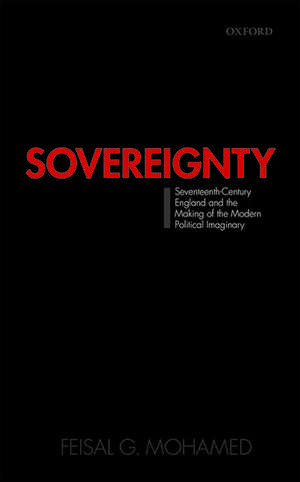Sovereignty: Seventeenth-Century England and the Making of the Modern Political Imaginary
Autor Feisal G. Mohameden Limba Engleză Hardback – 14 feb 2020
Preț: 484.11 lei
Preț vechi: 619.99 lei
-22% Nou
Puncte Express: 726
Preț estimativ în valută:
92.64€ • 99.06$ • 77.24£
92.64€ • 99.06$ • 77.24£
Carte disponibilă
Livrare economică 17-24 martie
Preluare comenzi: 021 569.72.76
Specificații
ISBN-13: 9780198852131
ISBN-10: 0198852134
Pagini: 232
Dimensiuni: 142 x 223 x 19 mm
Greutate: 0.41 kg
Editura: OUP OXFORD
Colecția OUP Oxford
Locul publicării:Oxford, United Kingdom
ISBN-10: 0198852134
Pagini: 232
Dimensiuni: 142 x 223 x 19 mm
Greutate: 0.41 kg
Editura: OUP OXFORD
Colecția OUP Oxford
Locul publicării:Oxford, United Kingdom
Recenzii
I enjoyed Sovereignty a great deal: it is thoughtful, argumentative, and bristling with insights and ideas. Feisal Mohamed is a serious critic who can travel over familiar ground and discover new things
wide-ranging book
Feisal Mohamed's Sovereignty is a significant contribution to our understanding of how the crises of seventeenth-century England contributed totwentieth-century political thought. Each chapter of Mohamed's bookoffers a wide-ranging inquiry into the political concerns and literary endeavors of key figures in Commonwealth and Restoration culture and concludes with an effort to bring these seventeenth-century developments intodialogue with the controversial German legal theorist Carl Schmitt (1888–1985), whose concept of sovereignty, and its parallel critique of liberal democracy, was informed by a fascination with early modern England. Mohamed'sbook invites searching questions about the roots of liberalism in the AngloAmerican tradition and that liberal tradition's complicity with its apparentopposite, an often authoritarian conception of unitary sovereignty.
acerbic, pithy and scrupulously intelligent ... [the book] is thoughtful, argumentative, and bristling with insights and ideas
Professor Mohamed is a distinguished student of English Renaissance literature who also has formidable expertise in political philosophy and legal history. This knowledge has been admirably distilled in this study, and ably accommodated to the understanding of students and scholars of the period. I particularly enjoyed the reading of John Barclay and the romances of the 1650s, the fresh understanding of Milton's Paradise Regained, and the shrewd account of Marvell's reworking of Cavalier poetry -- and the epilogue on Uzzah is a triumph. I learned an immense amount from the book, and heartily recommend it.
Feisal Mohamed's Sovereignty is an impressively original, interdisciplinary contribution to the study of seventeenth century political thought and to contemporary democratic theory. Employing tools from literary theory and intellectual history, Mohamed sheds new light on debates over sovereignty in seventeenth century England and their legacies in twentieth century state theory. A powerful re-reading of sovereignty from Hobbes to Schmitt.
This stimulating, ambitious interdisciplinary study, as its subtitle indicates, links seventeenth century and modern concerns...Feisal Mohamed's consistently intelligent and stimulating study of what he calls "the political imaginary" asks the right questions.
wide-ranging book
Feisal Mohamed's Sovereignty is a significant contribution to our understanding of how the crises of seventeenth-century England contributed totwentieth-century political thought. Each chapter of Mohamed's bookoffers a wide-ranging inquiry into the political concerns and literary endeavors of key figures in Commonwealth and Restoration culture and concludes with an effort to bring these seventeenth-century developments intodialogue with the controversial German legal theorist Carl Schmitt (1888–1985), whose concept of sovereignty, and its parallel critique of liberal democracy, was informed by a fascination with early modern England. Mohamed'sbook invites searching questions about the roots of liberalism in the AngloAmerican tradition and that liberal tradition's complicity with its apparentopposite, an often authoritarian conception of unitary sovereignty.
acerbic, pithy and scrupulously intelligent ... [the book] is thoughtful, argumentative, and bristling with insights and ideas
Professor Mohamed is a distinguished student of English Renaissance literature who also has formidable expertise in political philosophy and legal history. This knowledge has been admirably distilled in this study, and ably accommodated to the understanding of students and scholars of the period. I particularly enjoyed the reading of John Barclay and the romances of the 1650s, the fresh understanding of Milton's Paradise Regained, and the shrewd account of Marvell's reworking of Cavalier poetry -- and the epilogue on Uzzah is a triumph. I learned an immense amount from the book, and heartily recommend it.
Feisal Mohamed's Sovereignty is an impressively original, interdisciplinary contribution to the study of seventeenth century political thought and to contemporary democratic theory. Employing tools from literary theory and intellectual history, Mohamed sheds new light on debates over sovereignty in seventeenth century England and their legacies in twentieth century state theory. A powerful re-reading of sovereignty from Hobbes to Schmitt.
This stimulating, ambitious interdisciplinary study, as its subtitle indicates, links seventeenth century and modern concerns...Feisal Mohamed's consistently intelligent and stimulating study of what he calls "the political imaginary" asks the right questions.
Notă biografică
Feisal G. Mohamed is Professor of English at The Graduate Center, CUNY, where he also serves as coordinator of The Program in Global Early Modern Studies. His previous books include In the Anteroom of Divinity: The Reformation of the Angels from Colet to Milton (2008) and Milton and the Post-secular Present: Ethics, Politics, Terrorism (2011). He is a past recipient of a Mellon Foundation New Directions Fellowship, which provided second-discipline training in law.
